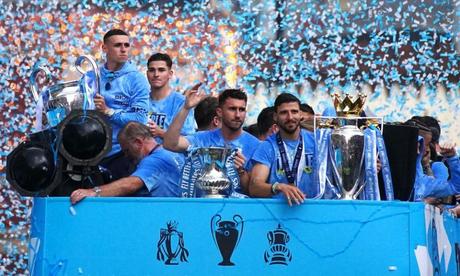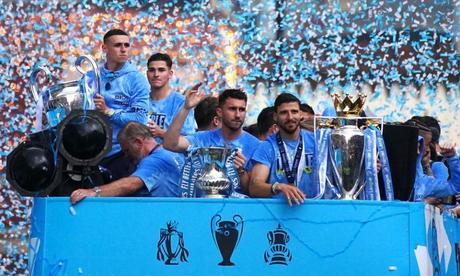Tick Tock. People love an extinction event. Entire religious mythologies, entire episodes of Star Trek tend to go this way, toward hubris and nemesis, the idea of the end times.
For the Mayans, the end of the world was set for December 21, 2012, which in retrospect might have been a decent offer to accept. The entire cultural history of the 1980s is basically Midge Ure walking through the Vienna fog in a leather overcoat, surrounded by rotting grandeur and laughing Nazi yuppies, waiting for mega death to fall from the sky.
Except, of course, that things keep happening. The world keeps ending, but people keep asking where the party is. The draw for the European Championship is about to take place. King Charles is concerned about methane. Midge Ure currently lives in Somerset. We pretty much remain pre-Skynet.
Related: Everton appeals and indicates tension over the independence of the committee
It's worth keeping this in mind when considering the ominous news that Manchester City and the Premier League have agreed a date for the processing of these financial charges on an epic scale, a moment that feels like an existential threat, not only for City but also for the future of the club. league itself.
According to reports first published in the Daily Mail, the tribunal will begin next fall, with a ruling likely in spring 2025. Even without an appeal, that will be two years after the indictment, a wait that has already caused some anger .
There is a good reason for the delay. This is not Everton, who have admitted guilt on a single charge. City denies all 115 charges and has gone through Logan Roy's divorce book, hiring every human lawyer available, from Lord Helicopter-Gunship KC to the man in The Wire who knows where Marlo Stanfield is.
In fact, the danger here is enormous, for both the suspect and the accuser. The charges scroll back over 14 seasons. City are, given that period, the most profitable entity in world football, the poster boys of the Premier League. In an industry where the product is essentially broadcast rights and lucrative stability, it is in many ways surprising that these charges have even gotten this far.
The story continues
But we now have a ticking clock. There is, as the man on the radio put it, an Asterix (sic) hanging over City and also over the credibility of the league itself. With that in mind, there are probably two things worth saying at this point.
Firstly, there is the temptation to see a potential extinction of the Premier League. The defining tension in world football right now is about who gets to own the product. The Super League was shambolicly executed. It continues to run absurdly in the background, now tied to charter agreements and government warnings. But it's not exactly dead. Some aspect of this idea will shape the future.
How long can an empire last? City's fans have been among the most vocal in rejecting the idea of escape, railing against greed, money and the overclass in a way that is both encouraging and a good example of dramatic irony (Google: inherited monarchy) .


Stop fines and point deductions, plus another five years of dissolution of the collective will. How strong do we feel? How united is a Premier League where generational champions are at war with their own governing body? Perhaps this is exactly where the story was always going: a league that kept opening its door to every passing caller, and ultimately becomes hostage to its own greed. Let the right one in.
But again, what is the most likely outcome? I remain deeply skeptical that football, which exists within an absurdly self-righteous bubble, will be able to decide how this thing plays out free from any outside influence. This isn't Truther-style, "don't trust the government" stuff. It's the opposite. Trust that the government will continue to behave as governments have always done.
Manchester City is not a football club in this context. It is an arm of a highly influential nation-state, with which Britain traded £25 billion last year. Two years ago, the UAE, led by Abu Dhabi's Mubadala sovereign wealth fund, agreed a billion-pound investment in British infrastructure. Mubadala's chief executive, Khaldoon al-Mubarak, is also chairman of Manchester City.
The same year, the British Prime Minister met Sheikh Mohamed bin Zayed al-Nahyan, Deputy Supreme Commander of the UAE Armed Forces, to agree on a major defense pact. Sheikh Mohamed's brother is Sheikh Mansour, the de facto owner of Manchester City. Er. Can we talk about this football thing for a minute?
This is just realpolitik here. We know that the Foreign Office has discussed the Premier League's allegations with its counterparts in Abu Dhabi. We know that ministers are prepared to stand before the Department for Culture, Media and Sport and absurdly insist that Newcastle is owned by "a fund" and not by a state actor, because this is a necessary line and this vital relationships are like Britain. collides in a world ravaged by war and carbon dependence.
What would be the most normal outcome? That a bunch of football administrators are given free rein to decide what happens here? It is even quite funny that football is surprised or aggrieved by this. Invite a government to take ownership of one of your clubs and you are asking an entity concerned solely with its own strategic interests to adhere to rules set by employees of a foreign sports league.
There's one more point worth making before this starts to feel too much like a doomsday scenario. Ultimately, football is just content. And for the neutrals, these accusations are perhaps the most objectively interesting thing about the current City era, a struggle that will now define this era of success and indeed the future of elite club football.
This is not to say that the team hasn't been beautiful, or that the football isn't enticing. Pep Guardiola has transformed English football tactically and structurally. The players are compelling because great players are compelling. Watching Bernardo Silva play football is like watching a lovable field mouse win 25 games of chess at once, while also defeating an army of orcs with just a tickle stick.
But this is also a cold project for the neutrals. Great teams tend to express something, from that Catalan-Dutch sense of modernism to the simple romance of a few individuals drawn together by serendipity and hard work. What does this express to Manchester City, other than the self-evident assumption that the richest club in the richest league, with the best manager and the best backroom staff, all put together without danger, personal interest or financial risk, will inevitably succeed. The final shape expresses a kind of sporting perfection, free of edges, a machine designed to win.
But now we have this. We have rebellion, we have struggle, we have the absurd but compelling spectacle of the richest club in the world, owned by a sovereign wealth fund, presenting itself as an underdog kicking against incentives.
Booing the outclass, raising a fist at the cartel while remaining the richest and most powerful single player on the field: this is a beautiful liberation. At the very least, it fills the void, the fundamental futility of winning at the behest of a state. Instead we have the Damned City, and in one fell swoop this becomes a story you won't be able to take your eyes off.
This tension will last another year and a half before a decade of elite success has to be rearranged by a tribunal's decision. The story looks purposeful, honed to a degree. Maybe don't expect a bravura ending.
